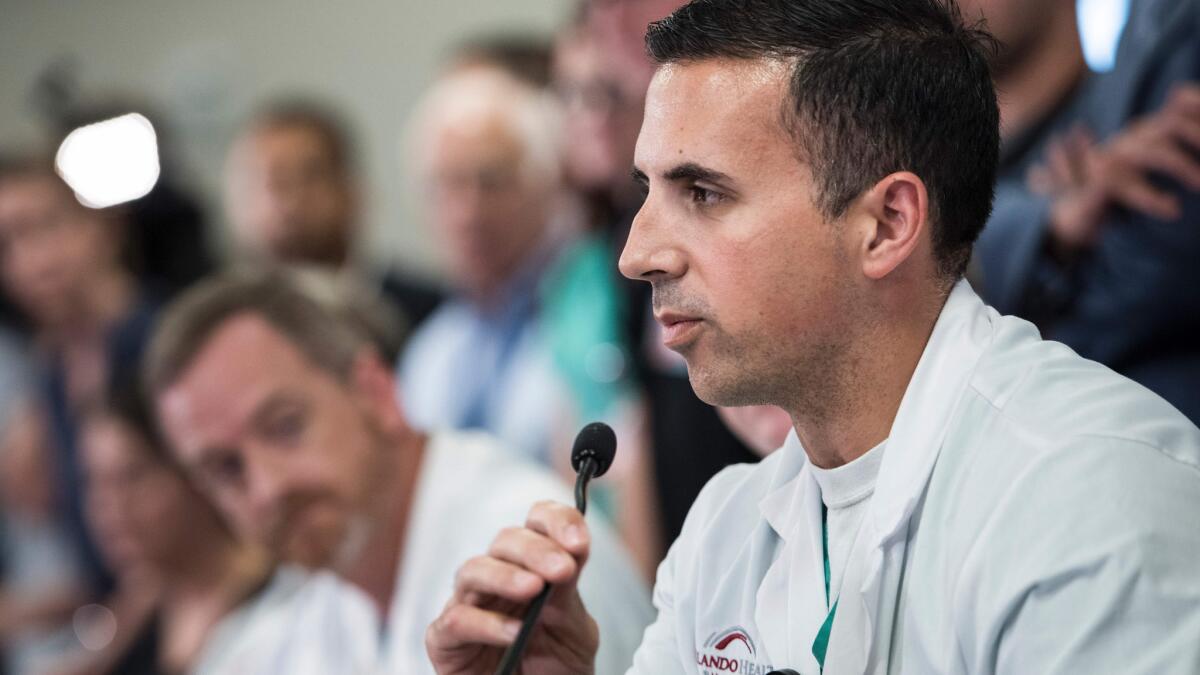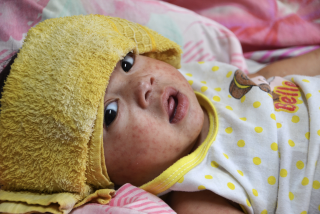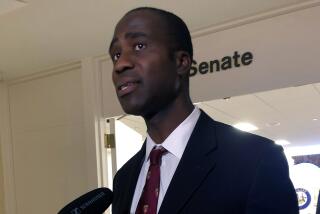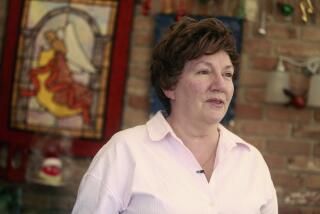Doctor who treated Orlando shooting victims addresses Islamophobia in wake of attack

Dr. Joseph “Joey” Ibrahim was making his rounds at Orlando Regional Medical Center this week, checking the dozen remaining victims of the Pulse nightclub shooting and bracing for more fallout, for more talk in the media about Muslims extremists.
Ibrahim’s father was a Muslim immigrant, just like the father of shooter Omar Mateen. Ibrahim isn’t Muslim, but people assume he is. Some strangers also might guess he speaks with an accent. And he does — the soft lilt of small town Tennessee.
“People need to learn acceptance,” said Ibrahim, 39. “Once people talk to me they realize this guy’s not a threat, he’s a hillbilly.”
Called to the hospital after the shooting June 12, Ibrahim hoped the attacker wouldn’t share his name because of what people would assume: that they were related, both radical threats.
I have to prove to people that I am trying to do good and I do want to represent, even though I am only half-Egyptian.
— Dr. Joseph Ibrahim
Ibrahim, who heads the hospital’s trauma unit, sees it as part of his job to be a goodwill ambassador — to the wounded and to the larger community scarred by the attack.
“I have to prove to people that I am trying to do good and I do want to represent, even though I am only half-Egyptian,” he said.
His father — an ear, nose and throat doctor — came to the U.S. from Cairo in the 1970s and trained in Nashville where he met Ibrahim’s mother, a nursing student and “Kentucky farm girl.” They settled in Elizabethton, Tenn., a town of about 14,000 where Ibrahim grew up.
Many thought he was Italian, he said, and compared to people with both parents from the Middle East, he faced only occasional discrimination (though some classmates’ fathers wouldn’t let them date him). When he was 19, he was stopped by a state trooper for driving 10 miles over the speed limit and asked “whether I had bombs in my vehicle.”
“Overall, I was very well accepted,” he said.
In high school, he met his wife, who went on to become a physical therapist. They married while he was still studying at East Tennessee State University, where he did his residency and surgical training.
Although his wife is white, she experienced some discrimination after she took his last name, Ibrahim said. Once, she was denied a loan because officials mistook her for someone on a European terror watch list, he said.
When their twin boys were born 11 years ago, the couple considered the price they would pay for their names. Traditionally, Ibrahim would pass his last and his middle name, Abdellatif, on to his eldest son.
Ibrahim’s mother advised him not to pass the name on to his son “so that he doesn’t have to undergo any scrutiny.”
“I remember her telling me she felt bad later on in life because she felt there were some things that might have been more difficult for me to attain because of my name,” he said.
The couple continued the tradition anyway.
“We decided hopefully actions speak louder than words and names,” he said.
FULL COVERAGE: Orlando nightclub shooting »
They moved to central Florida four years ago so they could “grow up around people from different cultures and for them to learn acceptance,” he said.
The morning of the shooting, that diversity became a strength as Ibrahim joined gay, Asian, Latino and Jamaican nurses tending to the wounded.
He was at the hospital for more than 36 hours after the shooting. The next couple of nights he didn’t get home until 8 p.m.
Of 44 victims treated at the hospital, nine died within minutes of arriving at the facility. The rest lived.
Days after the shooting, Ibrahim noticed one of the victims up and walking while he was making rounds. She had been shot in the chest and extremities but had her family behind her and was smiling.
“It kind of signified, hey, we’re going to get through this,” he said.
But as the surgeon listened to talk radio programs driving home from work, he heard Orlando residents demanding that immigration officials block Muslim immigrants from entering the country. Ibrahim thought of his father: What would have become of him if he had not been admitted to the U.S.?
“I wouldn’t have had the honor to be here and work beside these folks who were working incredibly hard to save all the lives they could,” he said. “To think I could have missed that if my dad had not been allowed in, that’s bothersome.”
He wishes his father, who died the same month he graduated medical school, were still around to discuss all that has unfolded, although he was able to talk to his mother after she flew down from Tennessee last weekend.
As a nurse, he said, “she understands what it’s like to lose patients and the stress of trying to keep them alive. It’s wonderful to be able to decompress with her.”
Now people who see Ibrahim around town stop to thank, hug and take photos with him.
But he still worries about how people see his sons.
Before the shooting, the family had gone to The Escape Game, an attraction in which players are provided a scenario to navigate — in their case, an FBI puzzle involving three terrorists, one named Ibrahim.
Last week, when Ibrahim dropped one of his sons at a baseball game, something caught his eye.
“On his jersey it has his name,” he said. “I couldn’t help wonder how people would respond to that. Are people going to recognize my name as someone who helped respond in a time of need, or are they going to see that as a threat?”
molly.hennessy-fiske@latimes.com
Twitter: @mollyhf
ALSO
How the Orlando attack could mark a shift for gay Muslims
In Islamic State-held areas, being gay often means a death sentence
After Orlando mass shooting, Orange County kicks off gay parade Saturday with tighter security
More to Read
Start your day right
Sign up for Essential California for news, features and recommendations from the L.A. Times and beyond in your inbox six days a week.
You may occasionally receive promotional content from the Los Angeles Times.







